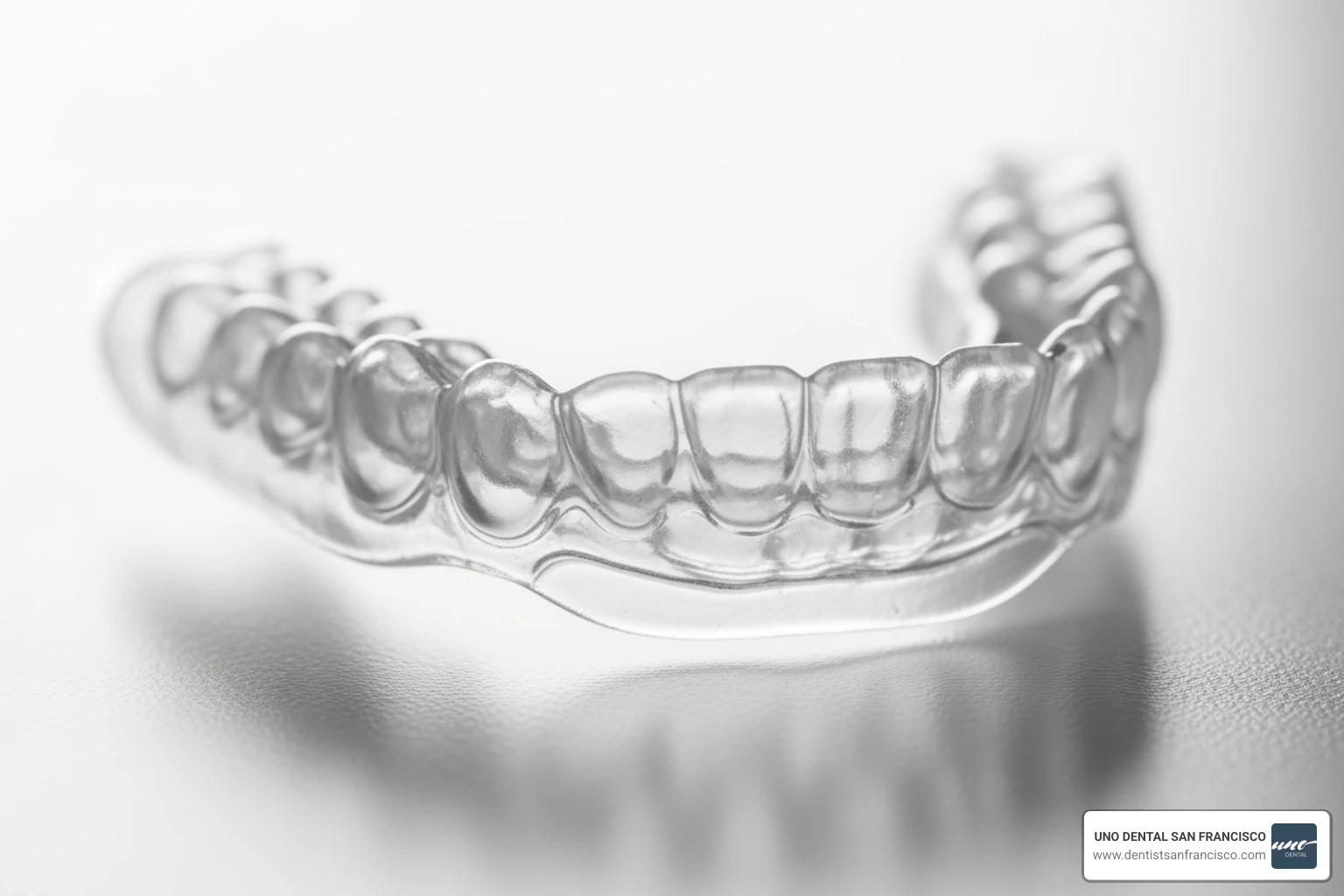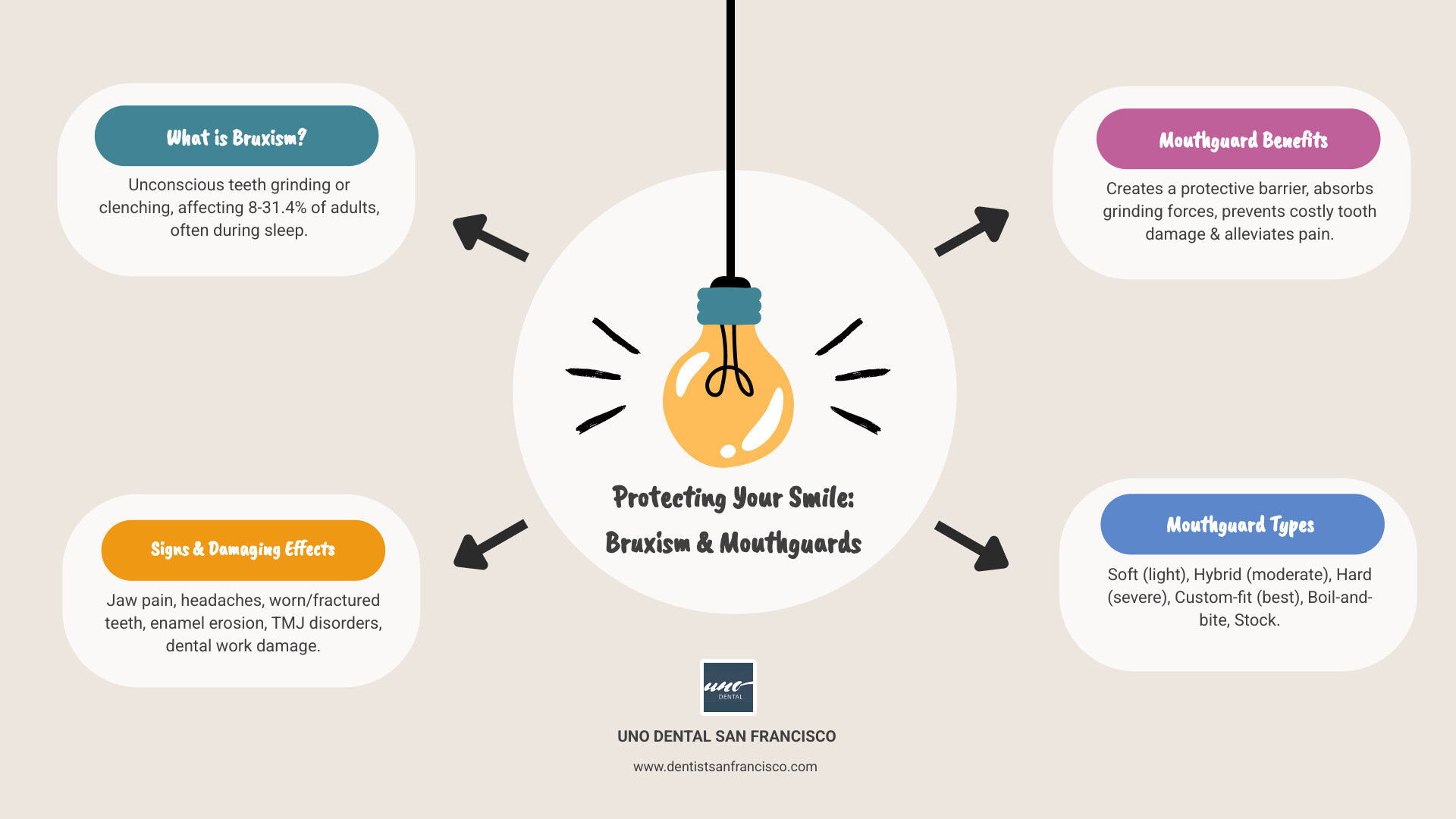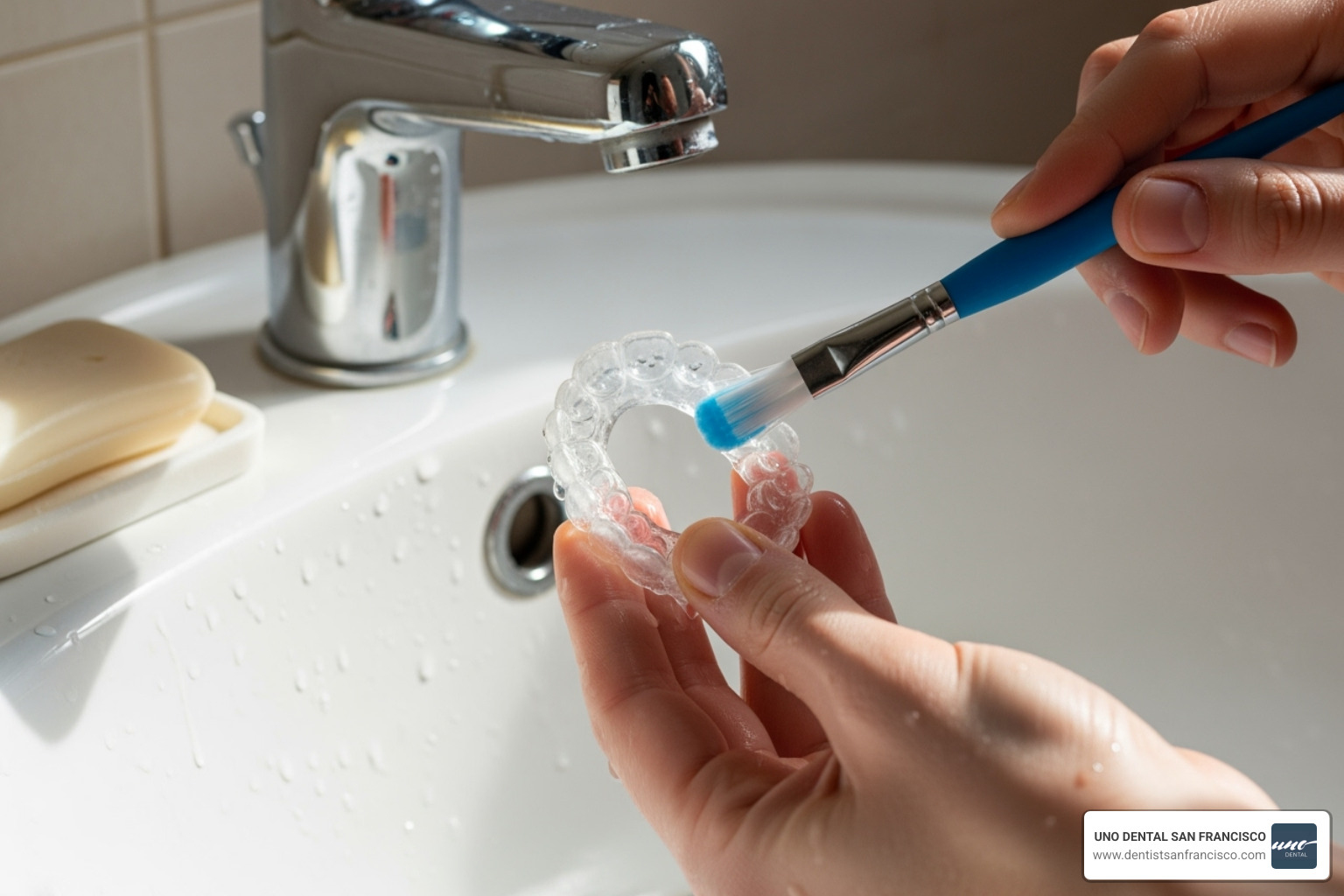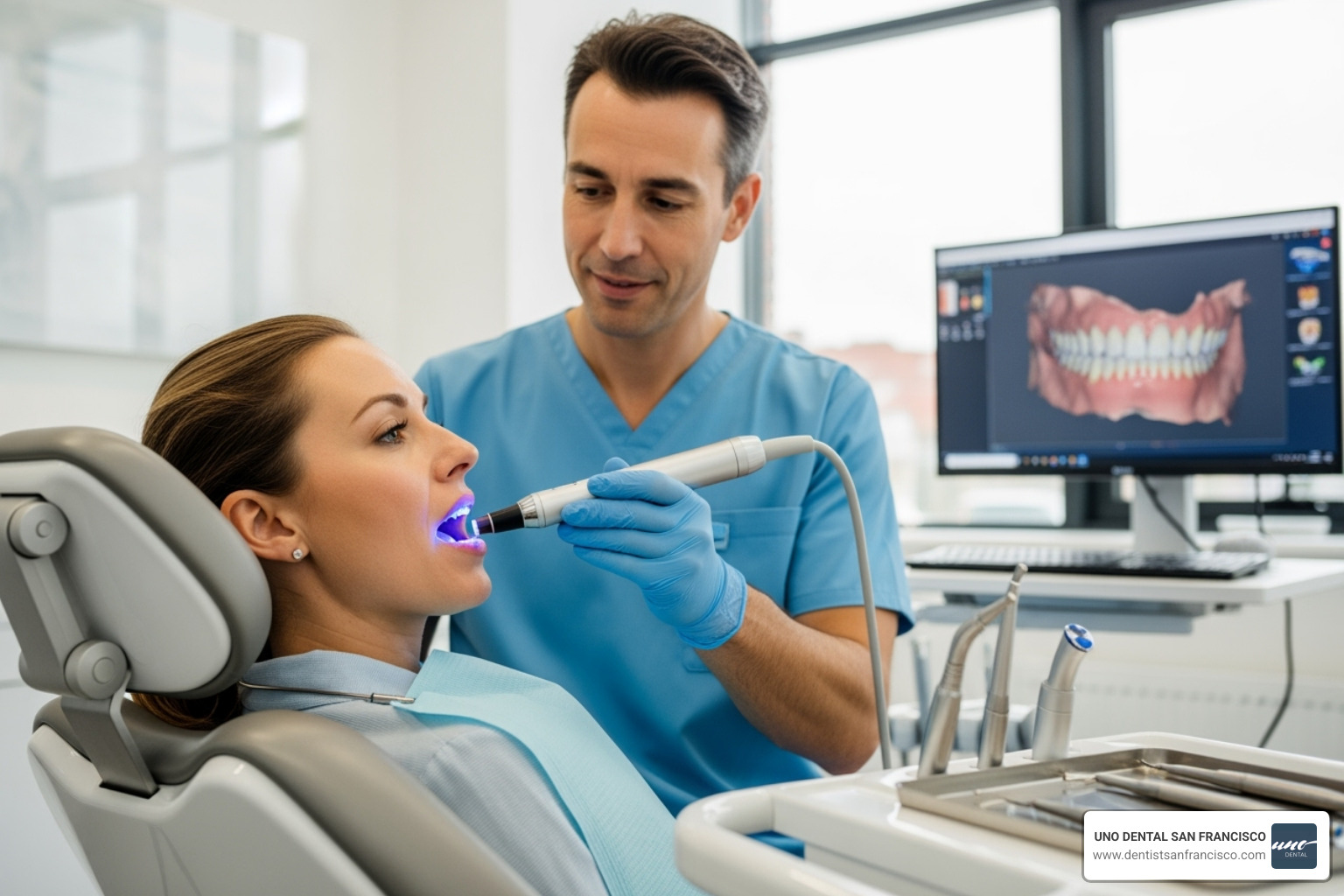
Why Protecting Your Teeth From Grinding Matters
Mouthguard For Grinding is essential protection for the millions of adults who unknowingly clench or grind their teeth. Research shows that teeth grinding (bruxism) affects between 8% to 31.4% of adults, making it one of the most common dental conditions.
Quick Guide to Mouthguards for Grinding:
- Soft Guards: Best for light grinding and sensitive teeth (1mm thickness)
- Hybrid Guards: Dual-layer design for moderate grinding (soft inside, hard outside)
- Hard Guards: Maximum protection for severe grinding (2-3mm thickness)
- Custom-Fit: Superior comfort and protection, made by dentist
- Boil-and-Bite: Moldable at home, moderate protection
- Stock Guards: One-size-fits-all, basic protection
Most people grind their teeth during sleep without realizing it. The American Dental Association reports that common symptoms include jaw soreness, dull headaches, and fractured teeth.
Without proper protection, grinding can cause:
- Worn down tooth enamel
- Chipped or cracked teeth
- Jaw muscle strain and TMJ disorders
- Damage to existing dental work
The good news? A properly fitted mouthguard acts as a protective barrier between your upper and lower teeth, absorbing the grinding forces and preventing costly damage.
As Mohammad Aghiad Kandar DDS at UNO DENTAL SAN FRANCISCO, I've helped countless patients find relief from bruxism through custom Mouthguard For Grinding solutions. With over 15 years of experience in restorative and prosthodontic care, I understand how the right mouthguard can protect your investment in your smile while improving your sleep quality.
Reviewed by Mohammad Aghiad Kandar, DDS, UNO DENTAL SAN FRANCISCO.
Understanding Bruxism: The "Why" Behind Teeth Grinding
Have you ever wondered why your jaw feels tight in the morning, or why you wake up with a dull headache? You might be one of the millions of people who grind their teeth at night without even knowing it.
Bruxism is the medical term for teeth grinding and jaw clenching – and it's far more common than you might think. This unconscious habit comes in two main forms: sleep bruxism, which happens while you're dreaming away, and awake bruxism, which occurs during your waking hours when you're stressed or concentrating.
Sleep bruxism is particularly sneaky because you're completely unaware it's happening. Your partner might hear it before you feel it! This is exactly why a Mouthguard For Grinding becomes such a game-changer – it protects your teeth even when you can't protect them yourself.
So what's behind all this grinding? While every person's situation is unique, several common culprits tend to show up repeatedly. Stress and anxiety top the list – when life gets overwhelming, our bodies often hold that tension in our jaws. It's like our mouth becomes a pressure valve for all the day's worries.
Misaligned teeth can also play a role. When your bite doesn't fit together quite right, your jaw might unconsciously search for a more comfortable position, leading to grinding. Additionally, sleep disorders like sleep apnea can trigger bruxism as your body tries to keep your airway open.
The American Dental Association has identified several telltale signs that bruxism might be affecting you. Jaw soreness is often the first clue – that tired, achy feeling when you wake up means your jaw muscles have been working overtime all night.
Dull headaches, especially around your temples in the morning, are another red flag. Your teeth might feel worn or fractured, and you may notice increased tooth sensitivity to hot or cold foods. Some people even experience facial pain or earaches that seem to come from nowhere.
If any of these symptoms sound familiar, don't ignore them. Left untreated, bruxism can develop into more serious conditions like TMJ disorders, which affect the joints that connect your jaw to your skull. You can learn more about this complex condition and how we address it on our TMJ Dysfunction: What Is It and How Is It Treated? page.
The Damaging Effects of Grinding on Your Oral Health
Think of your teeth as precious gems – they're incredibly strong, but even diamonds can be damaged with enough pressure. Night after night of grinding creates a slow but relentless force that can seriously compromise your oral health.
Tooth enamel erosion is often the first casualty. Your enamel is the hardest substance in your body, but constant grinding gradually wears it away like sandpaper on wood. Once it's gone, it's gone forever, leaving the softer, more sensitive layer underneath exposed.
The pressure from grinding can cause chipped or cracked teeth, especially along the biting edges. These might start as tiny hairline cracks that you can't even see, but they can deepen over time, potentially leading to pain, infection, or even tooth loss.
If you have existing dental work, bruxism can be particularly costly. Damage to dental restorations like fillings, crowns, or bridges is common when grinding forces exceed what these materials were designed to handle. Understanding What Does Restoration Mean in Dentistry? helps you appreciate just how much grinding can threaten your investment in your smile.
Jaw muscle strain is another serious concern. These muscles weren't designed to work continuously through the night, so they become overworked, leading to chronic soreness and fatigue. Simple activities like eating breakfast or having a conversation can become uncomfortable.
Perhaps most concerning is the development of TMJ disorders. The temporomandibular joints that connect your jaw to your skull bear the brunt of grinding forces. Over time, this can lead to pain, clicking sounds, limited jaw movement, or even jaw locking. If you're experiencing any of these symptoms, our comprehensive TMJ Treatment San Francisco services can help restore comfort and function.
The good news? All of these problems are preventable with the right protection. A properly fitted Mouthguard For Grinding acts as a shock absorber, taking the punishment so your teeth don't have to.
The Solution: How a Mouthguard for Grinding Provides Relief
Think of a Mouthguard for Grinding as your teeth's personal bodyguard – a dedicated protector that works the night shift while you sleep peacefully. When bruxism threatens your smile, this simple yet effective device steps in to absorb the punishment your teeth would otherwise endure.
The magic happens through a cushioning effect that transforms destructive grinding into harmless compression. Instead of your teeth grinding directly against each other with bone-crushing force, they press into the resilient material of the guard. It's like having a shock absorber for your mouth – the guard takes the hit so your teeth don't have to.
This shock absorption is crucial because grinding forces can exceed 200 pounds per square inch. Your Mouthguard for Grinding disperses these intense forces across its surface, dramatically reducing the impact on your teeth, jaw joints, and surrounding muscles. Without this protection, those forces go straight into wearing down your precious tooth enamel.
The most important function is preventing tooth-on-tooth contact entirely. By creating a physical barrier between your upper and lower teeth, the mouthguard eliminates the direct grinding that causes enamel wear, chipping, and those telltale flat spots on your teeth. Your teeth simply cannot reach each other to cause damage.
As the guard does its protective work, it also reduces muscle strain throughout your jaw. When your muscles can't clench with their usual intensity, they naturally begin to relax. This means fewer morning headaches, less jaw soreness, and a more comfortable start to your day.
Many of our patients are amazed at how quickly a properly fitted mouthguard alleviates jaw pain. By reducing muscle hyperactivity and protecting the delicate TMJ joints, the guard helps break the cycle of pain and tension that often accompanies bruxism. Better sleep and pain-free mornings become the new normal.
If you've invested in restorative dental work, your mouthguard becomes even more valuable as it protects existing dental work. Whether you have a Dental Crown San Francisco restoration, fillings, or bridges, grinding forces can compromise their integrity. Your mouthguard ensures these investments remain pristine and functional for years to come.
Perhaps most importantly, a Mouthguard for Grinding prevents further damage from occurring. It's your proactive shield against future dental problems, potentially saving you from costly procedures and painful complications down the road. Think of it as insurance for your smile – a small investment that pays huge dividends in preserved oral health.
Choosing Your Shield: Types of Mouthguards and Materials
Finding the right Mouthguard For Grinding is like choosing the perfect protective shield for your teeth. To make the best decision for your needs, it's important to understand the key factors that define a high-quality, effective mouthguard.
When selecting your protective shield, several key factors should guide your decision. Fit is absolutely crucial. A guard that is not molded precisely to your teeth will not provide adequate protection and can be uncomfortable to wear. Comfort goes hand-in-hand with fit, especially since you'll be wearing your guard for hours at a time, typically while sleeping.
Durability matters more than you might think. Your jaw muscles are incredibly strong, and a professionally made guard is built to last against the forces of grinding. Think of it as an investment in your oral health. Finally, material safety is non-negotiable. We use BPA-free materials and medical-grade thermoplastics that are safe for extended oral contact.
The Custom-Fit Advantage
A custom-fit Mouthguard For Grinding is the gold standard for protection. These are created from dental impressions taken specifically of your teeth, ensuring a fit that's as unique as your fingerprint. The result? Superior comfort and fit that makes wearing your guard feel almost natural. You'll get maximum protection because the guard is designed to work with your specific bite pattern and tooth alignment.
At UNO DENTAL SAN FRANCISCO, we use advanced technologies to ensure your custom Mouthguard For Grinding fits perfectly and provides the protection your teeth deserve.
Matching the Guard to Your Grinding Severity
Not all grinding is created equal, and your custom Mouthguard For Grinding will be designed to match the intensity of your particular habit. Think of it like choosing the right tool for the job – you wouldn't use a feather duster to clean concrete, right?
For light grinding, soft guards are often the perfect starting point. These are typically made from flexible, cushioning materials that provide a comfortable barrier between your teeth. If you're someone who occasionally clenches during stressful periods or grinds lightly, a soft guard offers gentle protection without feeling intrusive.
Moderate grinding calls for hybrid (dual-layer) guards that combine the best of both worlds. These feature a soft inner layer for comfort against your teeth and a harder outer layer that can withstand more significant grinding forces. It's like having a comfortable pillow that's backed by solid protection.
For those dealing with severe, heavy grinding, hard guards are the heavy-duty option you need. Made from rigid, durable materials, these guards are designed to absorb and distribute intense grinding forces. While they might feel less cushiony initially, they're essential for preventing serious damage from aggressive bruxism.
The key is getting a professional recommendation based on your specific situation. During our comprehensive examination, we can assess the severity of your grinding and recommend the most appropriate type of Mouthguard For Grinding. This personalized approach is central to our Preventive Dentistry San Francisco philosophy – we believe in stopping problems before they start, rather than just treating them after they occur.
Living with Your Mouthguard: Care, Lifespan, and Special Considerations
Once you have your mouthguard for grinding, learning to live with it comfortably while maintaining proper care will ensure it serves you well for years to come.
Don't worry if your new mouthguard for grinding feels a bit strange at first – this is completely normal! Most people experience a brief adjustment period when they start wearing their guard. You might notice increased saliva production during the first few nights, or feel like your bite sensation has changed slightly. Some initial discomfort is also common as your mouth gets used to this new nighttime companion.
The good news is that these adjustment symptoms typically disappear within a few nights as your mouth adapts. Think of it like breaking in a new pair of shoes – a little patience goes a long way. However, if discomfort persists beyond a week or becomes significantly bothersome, don't hesitate to contact us. We can make adjustments to improve the fit and comfort.
Proper daily care is essential for keeping your mouthguard for grinding clean, hygienic, and effective. The routine is simple but important: rinse your guard immediately after use with cool water to wash away saliva and any debris that may have accumulated overnight. This quick rinse prevents bacteria from settling in.
For deeper cleaning, use a soft-bristled toothbrush with mild soap – hand soap or gentle dish soap work perfectly. Avoid using toothpaste, as it can be too abrasive and create tiny scratches where bacteria love to hide. Gently brush all surfaces of your guard, paying attention to any grooves or indentations.
Storage matters too. After cleaning, let your mouthguard air dry completely before placing it in its protective, ventilated case. This prevents moisture buildup that could lead to bacterial or fungal growth. Never use hot water for cleaning or leave your guard in hot cars or direct sunlight – the heat can warp the material and ruin the custom fit you paid for.
Custom-made guards are built to last and typically serve you well for 1 to 2 years or more with proper care, depending on the severity of your grinding.
You'll know it's time for a replacement when you notice holes, cracks, or significant thinning in the material, or if your guard no longer fits snugly. Bringing your mouthguard to your regular dental checkups allows us to inspect it for wear and ensure it's still providing optimal protection.
Special Cases: Mouthguards with Braces, Implants, and Sleep Apnea
Some patients have unique situations that require special consideration when using a mouthguard for grinding.
If you're currently wearing braces, you absolutely can and should use a mouthguard – especially if you grind your teeth! The forces from bruxism can actually damage your orthodontic appliances and interfere with treatment progress. For this situation, a custom-fitted mouthguard is essential. It must be specifically designed to accommodate your brackets and wires while protecting both your teeth and your orthodontic investment.
For patients with dental implants, protection becomes even more critical. Just like natural teeth, Dental Implants in San Francisco need safeguarding from the intense forces of grinding. A properly fitted mouthguard for grinding creates a protective barrier that prevents undue stress on your implants and the surrounding bone structure, helping preserve your investment for decades to come.
A mouthguard for grinding differs significantly from sports guards. While both cover your teeth, they serve different purposes. Sports guards are designed thick and bulky to absorb external impact from things like flying baseballs or hockey pucks. Grinding guards are engineered thinner and more comfortable for extended overnight wear, specifically targeting the internal forces of clenching and grinding. Using a sports guard for grinding would be uncomfortable and ineffective – like wearing work boots to bed!
Interestingly, certain types of oral appliances can also help with snoring and mild sleep apnea by gently repositioning your jaw forward to keep airways open during sleep. While a standard mouthguard for grinding isn't primarily designed for this purpose, some patients notice improved breathing. For those dealing with more significant sleep breathing issues, we offer specialized Sleep Apnea Oral Appliance treatments that can be life-changing alternatives to CPAP machines.
If you suspect you might have sleep apnea in addition to grinding, it's worth discussing both conditions during your consultation – we might be able to address multiple concerns with one well-designed appliance.
The Path to a Perfect Fit: Getting a Custom-Made Mouthguard
Getting a custom mouthguard for grinding is like having a suit custom just for you – except this one protects your smile while you sleep. The journey to perfect protection starts with understanding your unique needs and crafting a solution that fits like it was always meant to be there.
The professional process begins with getting to know you and your grinding habits. During your dental consultation, we'll sit down together to discuss what you've been experiencing. Are you waking up with headaches? Does your jaw feel tired? Has your partner mentioned hearing grinding sounds at night? These details help us understand exactly what's happening and how we can best help you.
Next comes the examination of your teeth and jaw. This isn't just a quick look – we're detective work here. We'll carefully examine every tooth for signs of wear, check for chips or cracks, and evaluate how your jaw moves. Sometimes the evidence of grinding tells a story that even you weren't aware of. We'll also assess your bite alignment and check your jaw joints to get the complete picture.
Taking impressions used to be the part of the process that made people nervous – you know, that gooey putty material that seemed to take forever to set. Thankfully, those days are behind us at UNO DENTAL SAN FRANCISCO. We use advanced digital scanning technology that captures thousands of precise images of your teeth in just minutes.
The physical putty vs. digital scanning difference is night and day. While traditional impressions can be messy and uncomfortable (not to mention that awful taste), digital scanning is clean, quick, and incredibly accurate. The scanner creates a detailed 3D model of your mouth that's more precise than any physical impression could ever be.
Once we have your digital model, it's off to lab fabrication. This is where the magic happens. Skilled technicians use your exact measurements to craft a mouthguard for grinding that's perfectly matched to your teeth. They select the right material and thickness based on how severe your grinding is and our specific recommendations. This process typically takes about one to two weeks – good things take time, after all.
The final fitting and adjustments appointment is always exciting because this is when you get to experience the difference a truly custom fit makes. We'll make sure your new mouthguard sits perfectly, feels comfortable, and doesn't interfere with your natural bite. If any tiny adjustments are needed, we can make them right there in the office.
What makes this process so effective is the attention to detail at every step. Your custom mouthguard for grinding isn't just molded to your teeth – it's designed around your specific grinding patterns, jaw structure, and comfort needs.
If you're curious about starting this process but prefer to explore your options first, our Virtual Smile Consultation lets you connect with us from home. It's a convenient way to discuss your concerns and learn about your treatment options before taking the next step toward protecting your smile.
Protect Your Smile with a Custom Solution
Think about it – every night while you sleep, your teeth might be grinding away years of healthy enamel. Bruxism isn't just a quirky habit; it's a real threat that can turn your beautiful smile into an expensive dental emergency. The damage adds up silently: worn-down teeth, painful cracks, strained jaw muscles, and even costly repairs to your existing dental work.
But here's the good news: protecting your smile can be as simple as slipping in a Mouthguard For Grinding before bed.
Why custom-fit mouthguards are worth every penny is clear. A custom Mouthguard For Grinding is crafted specifically for your unique bite, your jaw shape, and your grinding patterns. The result? A guard that feels so natural you'll barely notice you're wearing it, yet provides maximum protection against the forces that could damage your teeth.
At UNO DENTAL SAN FRANCISCO, we've seen countless patients transform their sleep quality and protect their smiles with our custom solutions. Dr. Mohammad Aghiad Kandar brings over 15 years of expertise in restorative and prosthodontic care, ensuring your Mouthguard For Grinding isn't just protective – it's perfectly custom to your needs.
Taking that first step is easier than you might think. During your consultation, we'll assess your grinding patterns, examine any existing damage, and create a treatment plan that fits both your mouth and your lifestyle. Our advanced technology means getting impressions is comfortable and precise, leading to a guard that truly works.
Don't let another night of grinding chip away at your confidence and comfort. Your smile deserves the best protection available, and we're here to provide exactly that through our Comprehensive Dental Care in San Francisco.
Ready to wake up without jaw pain? Contact us today to schedule your consultation and find how a custom Mouthguard For Grinding can be your smile's best friend.



